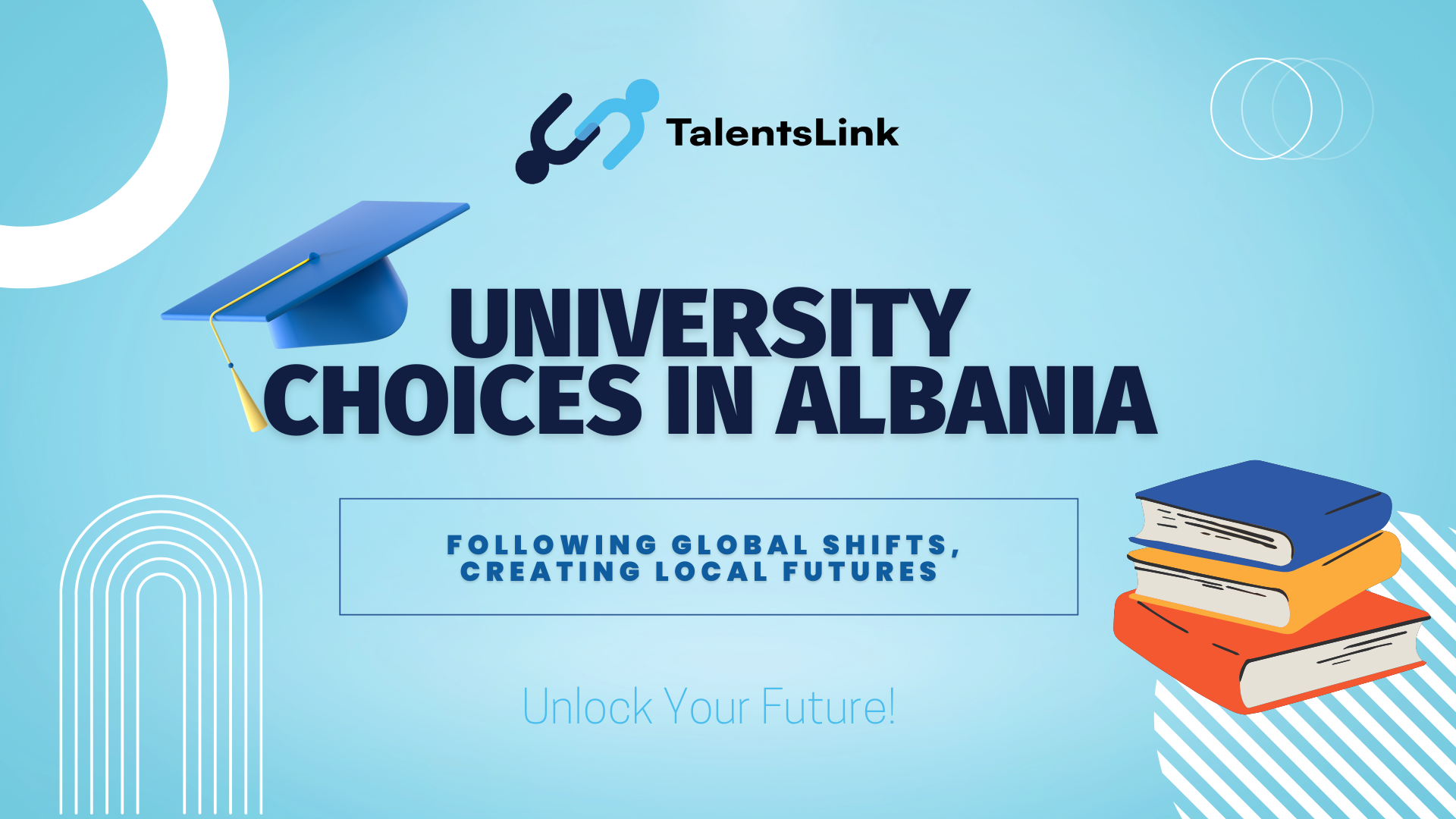University Choices in Albania: Following Global Shifts, Creating Local Futures
Every September, thousands of young Albanians face one of the most important decisions of their lives: What should I study?
For years, the answers seemed predictable: law, economics, education, or social sciences. But over the past decade, those patterns have shifted dramatically. The choices of today’s students are not only shaping their personal futures but also the direction of Albania’s economy and society.
Data from INSTAT paints a striking picture: between 2016 and 2024, the number of students in humanities, arts, social sciences, and education has fallen by nearly half. Social sciences and journalism have declined by about 40%, while natural sciences and mathematics have almost halved. Education degrees have lost a quarter of their students. Even agriculture and veterinary studies, critical to a sustainable future, have seen enrolments shrink by almost 45%.
Meanwhile, two fields are on the rise. Health sciences (medicine, nursing, well-being) have grown by 22% in just six years, while engineering has risen by 15%. In fact, in 2024, almost one in five Albanian students is enrolled in an engineering program, up from 14% in 2018.
This trend is not unique to Albania. Across Europe and the Western Balkans, students are increasingly pragmatic, focusing on careers with high employability—IT, engineering, health,while traditional fields decline. In Albania, the decline is sharper: students often make choices out of necessity, balancing personal interest with job security and international mobility. Private universities are gaining ground, growing by almost 46% since 2016, offering modern programs, international partnerships, and a faster path to employability. What is driving these decisions is:
- The job market’s pull. Young people are pragmatic. They see doctors, IT professionals, and engineers finding work more easily than teachers, journalists, or agricultural specialists. The promise of higher salaries and international mobility plays a big role.
- Demographic pressures. With fewer young people overall, competition for attractive study programs has intensified. Families want to invest in degrees that “guarantee” employability.
- Private universities are gaining ground. While public universities lost 26% of their students since 2016, private ones grew by almost 46%. Why? Because they are faster to adapt: offering programs in English, double degrees, and stronger links to global labor markets. For many Albanian students, a private degree is not simply an education, but an investment in international competitiveness.
Students are chasing security, opportunity, and relevance.But this pragmatic turn also raises questions. What happens when fewer and fewer students choose to become teachers, scientists, or agricultural experts? These professions may not feel as “glamorous,” but they are vital for Albania’s long-term development. Who will train the next generation if our faculties of education continue to empty? Who will innovate in food security if agricultural studies remain unattractive?This imbalance risks creating shortages in sectors that are already fragile and may push Albania to depend even more on importing expertise or talent from abroad.
At TalentsLink, we work closely with young people and employers, and we see the same story unfolding: students are making choices based on the signals they get from the labor market. That’s not wrong; in fact, it shows maturity and awareness. But it also shows a gap.The gap is this: students are not always equipped with full information about where the market is heading in 5, 10, or 15 years. They hear today’s salary comparisons, but they don’t always see the industries quietly rising (green economy, AI-driven sectors, sustainability, advanced manufacturing).
This is where guidance matters. Career counseling in schools, better labor-market data, and stronger collaboration between universities and employers could help young people make decisions that are not just safe today, but resilient tomorrow.
What advice can be drawn from this shifting landscape? At Talents Link, we believe the answer lies not only in choosing fields with high demand, but also in understanding intersections. The future of work rarely belongs to narrow specialists alone; it belongs to those who can bridge different areas of knowledge. A student who studies computer science but gains expertise in green skills can thrive in the emerging sustainability sector. A medical student who develops competence in health technology will stand out in a world increasingly shaped by digital solutions. An economics or law student who complements their studies with data analysis will have a clear advantage in both domestic and international markets.
The trends are clear: Albanian students are becoming pragmatic, chasing careers in health and technology. That is a good sign, it shows responsiveness to the labor market. But as a society, we must also reflect: Are we leaving behind fields that sustain our future?
For young people, the advice is simple: invest in discovering yourself, in learning where your strengths lie, and in understanding how markets are shifting, both at home and abroad. Don’t let trends make the choice for you. Let your skills, your heart, and your vision for the future guide you.
At the end of the day, university is not just about choosing a degree. It’s about choosing the role you want to play in the world.

